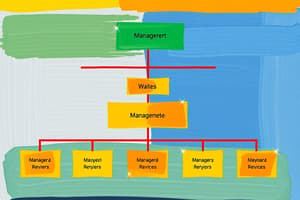Podcast
Questions and Answers
The primary focus of the Behavioral Approach is on the financial performance of an organization.
The primary focus of the Behavioral Approach is on the financial performance of an organization.
False (B)
Which of the following is NOT an approach in the evolution of management thought?
Which of the following is NOT an approach in the evolution of management thought?
- Cognitive Approach (correct)
- Systems Approach
- Human Relations Movement
- Scientific Management
What are the three main categories of approaches in the evolution of management thought?
What are the three main categories of approaches in the evolution of management thought?
Classical, Neo-Classical, and Modern Approaches
Match the following managerial roles with their descriptions:
Match the following managerial roles with their descriptions:
The __________ Approach focuses on the use of quantitative techniques and analysis in decision making.
The __________ Approach focuses on the use of quantitative techniques and analysis in decision making.
Flashcards are hidden until you start studying
Study Notes
Introduction to Management
- Management is the process of planning, organizing, leading, and controlling an organization's resources to achieve its goals.
- It involves coordinating and integrating diverse activities to reach a common objective.
- Effective management is crucial for any organization's success.
Managerial Roles and Skills
- Mintzberg's Managerial Roles:
- Interpersonal: Figurehead, leader, liaison.
- Informational: Monitor, disseminator, spokesperson.
- Decisional: Entrepreneur, disturbance handler, resource allocator, negotiator.
- Managerial Skills:
- Technical: Proficiency in a specific area, like accounting or marketing.
- Human: Ability to work effectively with people, motivating and leading teams.
- Conceptual: Ability to think strategically and solve complex problems.
Evolution of Management Thought
-
Early Classical Approaches:
- Scientific Management (Frederick Winslow Taylor): Focused on improving efficiency through scientific methods, job specialization, and worker training.
- Administrative Management (Henri Fayol): Emphasized the importance of administrative principles like planning, organizing, commanding, coordinating, and controlling.
- Bureaucracy (Max Weber): Advocated for a structured, hierarchical organization with clear rules and procedures.
-
Neo-Classical Approaches:
- Human Relations Movement (Elton Mayo and others): Recognized the importance of human factors in workplace productivity, emphasizing communication, group dynamics, and employee morale.
- Behavioral Approach (Abraham Maslow, Douglas McGregor): Focused on individual behavior within organizations, exploring motivation, leadership, and organizational culture.
-
Modern Approaches:
- Quantitative Approach: Utilizes mathematical models and statistical analysis to solve business problems, emphasizing decision-making and resource allocation.
- Systems Approach: Views organizations as interconnected systems where parts work together to achieve goals, recognizing the importance of internal and external environments.
- Contingency Approach: Emphasizes that there is no one "best" way to manage and that the most effective approach depends on the specific situation and context.
Studying That Suits You
Use AI to generate personalized quizzes and flashcards to suit your learning preferences.




